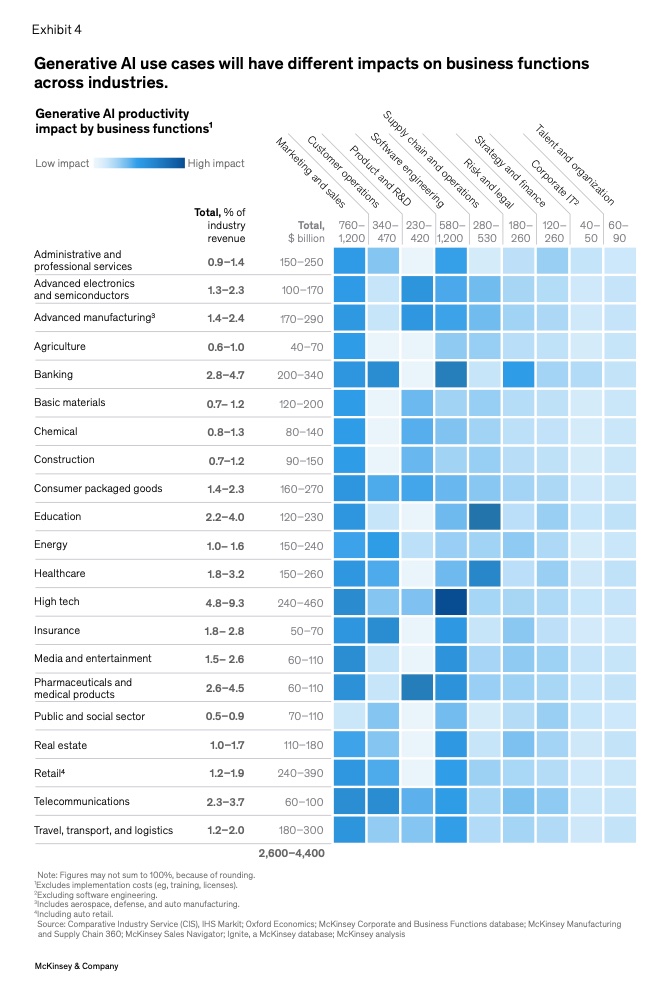How Marketing and Sales Could Be Transformed
In this blog post, we will examine the impact of Generative AI on marketing and sales. Generative AI already has a significant influence on marketing and sales, and it is expected to bring even greater changes in the future. Here are some of the potential effects:
Content Creation:
Generative AI models can assist in automatically generating high-quality content such as blog posts, product descriptions, email newsletters, and social media posts. This enables companies to produce high-quality content faster and more efficiently, scaling their marketing activities.
Personalization:
Generative AI can be used to generate personalized content and recommendations for customers. By analyzing user data and behavioral patterns, AI can create personalized advertising messages, product suggestions, and email campaigns tailored to individual customer needs and preferences.
Chatbots and Customer Service:
Generative AI enables the development of advanced chatbots capable of engaging in human-like conversations. These chatbots can answer customer queries, provide support, and make purchase recommendations, enhancing the customer experience and being available round the clock.
Market Research:
Generative AI can assist in conducting market research and data analysis. By processing large amounts of data, AI can identify patterns and trends, predict customer behavior, and provide insights that are helpful in developing marketing strategies and sales plans.
Visualization and Design:
Generative AI can be utilized to create visual content such as images, graphics, and videos. By using AI-based design tools, companies can quickly and cost-effectively produce high-quality visual content that effectively communicates their brand message.
Automated Advertising Optimization:
Generative AI can help optimize advertising campaigns. Through data analysis and testing of various variables such as target audiences, ad copy, and images, AI can automatically identify and optimize the most effective advertising strategies.
It is important to note that the use of generative AI may also raise ethical questions, particularly regarding data privacy, transparency, and potential manipulation. Companies should responsibly handle this technology and ensure compliance with legal and ethical standards.
1. The process of strategy development and implementation involves efficiently collecting market trends and customer data from unstructured sources such as social media, news, research, product information, and customer feedback to create impactful marketing and sales communication.
2. Awareness – Brand Awareness and Recognition Customers see campaigns tailored to their segmentation, language, and demographic characteristics.
3. Retention – Customer Loyalty and Retention Customers can access comprehensive information, comparisons, and dynamic recommendations, such as personalized “try-ons.”
4. Conversion – Measurement of Marketing Activities’ Success Virtual sales agents enabled by generative AI emulate human-like qualities such as empathy, personalized communication, and natural language processing to build trust and rapport with customers.
5. Evaluation for Purchase Decisions Customers are more likely to stay through tailored messages and rewards, and they can interact with AI-driven customer support chatbots that proactively manage the relationship, requiring fewer escalations to human agents.
The functions of marketing and sales have rapidly embraced generative AI, where text-based communication and personalization are driving forces on a large scale. The technology can create personalized messages tailored to individual customer interests, preferences, and behaviors, as well as handle tasks like generating initial drafts for brand advertisements, headlines, slogans, social media posts, and product descriptions.
However, the introduction of generative AI in marketing functions requires careful consideration. On one hand, there is a risk of mathematical models trained on publicly available data infringing on intellectual property rights without sufficient precautions against plagiarism, copyright infringement, and trademark violations. A virtual “try-on” application may generate biased representations of certain demographic characteristics due to limited or biased training data. Therefore, significant human oversight is required to ensure conceptual and strategic thinking aligned with each company’s specific needs.

The economic potential of generative AI
The next frontier of productivity Potential operational advantages of using generative AI in marketing includeHere are the potential operational advantages of using generative AI in marketing:
Efficient and Effective Content Creation
Generative AI has the potential to significantly reduce the time and effort required for ideation and content creation, resulting in valuable time savings. It can also ensure consistency across various content pieces and maintain a unified brand voice, writing style, and formatting. Teams can collaborate using generative AI that integrates their ideas into a cohesive work, enabling them to significantly enhance the personalization of marketing messages for different customer segments, geographies, and demographic characteristics. Mass email campaigns can be instantly translated into multiple languages with different images and messages tailored to each target audience. The ability of generative AI to produce content with varying specifications could increase customer value, attractiveness, conversion, and retention over time and on a larger scale than traditional techniques have allowed.
Improved Data Utilization
Generative AI can assist marketing functions in addressing the challenges posed by unstructured, inconsistent, and disparate data, such as data from different databases, by interpreting abstract data sources like texts, images, and diverse structures. It can help marketers better utilize data such as territory performance, aggregated customer feedback, and customer behavior to generate data-driven marketing strategies, such as targeted customer profiles and channel recommendations. Such tools can identify and summarize trends, key drivers, and market opportunities from unstructured data such as social media, news, scientific research, and customer feedback.
SEO Optimization
Generative AI can help marketers achieve higher conversion rates and lower costs through search engine optimization (SEO) for technical components of marketing and sales, such as page titles, image tags, and URLs. It can synthesize important SEO keywords, assist professionals in creating SEO content, and distribute targeted content to customers.
Product Discovery and Personalized Search
With generative AI, product discovery and search can be personalized by leveraging multimodal inputs from texts, images, and voice, along with a deep understanding of customer profiles. Technologies can utilize individual user preferences, behavior, and purchase history, for example, to assist customers in finding the most relevant products and provide personalized product recommendations.
It is important to consider the ethical implications and potential challenges associated with the adoption of generative AI in marketing. Ensuring safeguards against plagiarism, copyright infringement, and trademark violations is crucial when utilizing mathematical models trained on publicly available data. Additionally, careful attention and significant human supervision are required to ensure conceptual and strategic thinking tailored to each company’s specific needs.
Overall, generative AI presents promising opportunities for transforming marketing and sales, enhancing efficiency, personalization, and customer experiences. However, responsible and ethical implementation is key to harnessing its full potential while maintaining data privacy, transparency, and the integrity of marketing practices.
Generative AI could also transform how both B2B and B2C companies approach sales.
Here are two use cases for sales:
- Increasing Sales Probability: Generative AI could identify and prioritize sales leads by creating comprehensive consumer profiles from structured and unstructured data and suggesting actions to improve customer engagement at each touchpoint. For example, generative AI could provide better insights into customer preferences, potentially improving conversion rates.
- Enhancing Lead Development: Generative AI could assist sales representatives in nurturing leads by synthesizing relevant product sales information and customer profiles, and creating discussion scripts to facilitate customer conversations, including upselling and cross-selling talking points. It could also automate sales follow-ups and passively nurture leads until customers are ready for direct interaction with a human sales representative.
For instance, the capabilities of generative AI to identify leads and facilitate follow-ups could uncover new leads and enable more effective engagement, resulting in additional revenue generation. Moreover, the time saved by sales representatives through the capabilities of generative AI could be invested in higher-value customer interactions, leading to increased sales success.
Generative AI as a Virtual Employee
In other cases, generative AI can add value by collaborating with employees and supporting their work in a way that accelerates productivity. Its ability to process vast amounts of data quickly and draw conclusions allows the technology to offer insights and options that significantly improve knowledge management. This can greatly expedite the product development process and provide employees with more time for higher-impact tasks.
Generative AI could increase sales productivity by 3 to 5 percent of the current global sales expenditure.
Source: McKinsey Study 2023: The economic potential of generative AI: The next productivity frontier.
